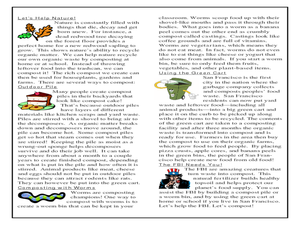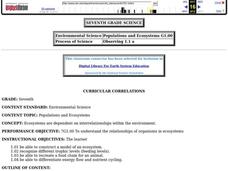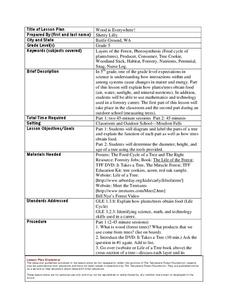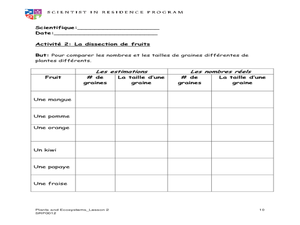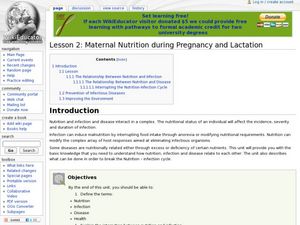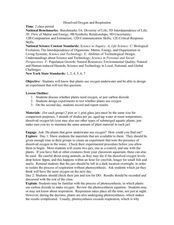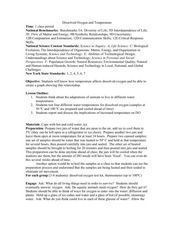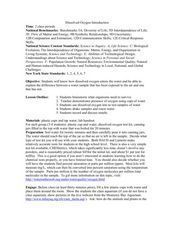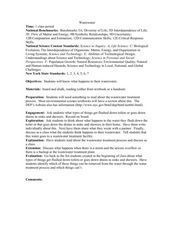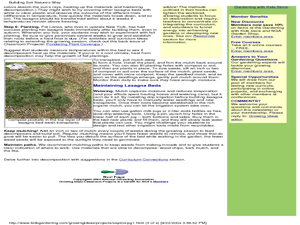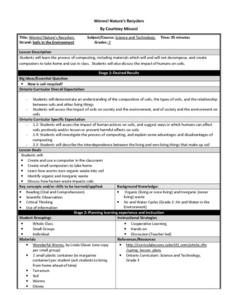Curated OER
Nutrition and Body Image
Pupils study nutrition and how to maintain a healthy diet. In this adolescent nutrition lesson students complete several activities that allow them to see different nutrition scenarios.
Curated OER
RIDE THE WILD LEAF
Students identify and interpret that leaves provide food for new trees and plants. Students cut out leaves and glue them on the appropriate
number on included worksheet. Students collect different types of leaves and make leaf rubbings....
Curated OER
Gardening for Beauty, Food, and Enjoyment
First graders create their own garden. In this plant lesson, 1st graders discover the essential elements for a plant to grow. They planted their own garden and read the amount of space needed and the sunlight preferred for each plant.
Science Matters
Ecosystem Pre-Assessment
Test scholars' knowledge of ecosystems with a 20-question pre-assessment. Assessment challenges learners to answer multiple choice questions, read diagrams, and complete charts.
Curated OER
Let's Build a Worm Bin
Young scholars explore the process of decomposition. In this ecology and measurement instructional activity, students prepare a worm home to be used for vermicomposting. Young scholars weigh a group of worms and the added food, recording...
Curated OER
The Compost Bucket
Learners recognize that plants and soils have a close relationship. They view a photo essay on the common practice and natural process of composting. Afterwards, they observe the process of plant decay over the course of several days.
National Park Service
Reduce Our Carbon Footprint, Let’s Compost!
Roll up your sleeves and get a little dirty with this elementary and middle school compost lesson plan. All you need is a large plastic container, a couple old newspapers, some organic waste, and a few hundred worms and you're ready...
Curated OER
Populations and Ecosystems
Seventh graders create a model of an ecosystem and label it to show structure and function. They research the food web of an aquatic animal and also trace energy flow from the primary producer up the food chain.
Curated OER
Photosynthesis: Intake of Carbon Dioxide - Production of Oxygen
Students, after a long-term observation of photosynthesis with aquatic plants, assess the benefits of photosynthesis towards all living organisms. They explain in their own words the two cycles within photosynthesis. Guided discussion...
Curated OER
Wood is Everywhere!
Fifth graders diagram and label the parts of a tree. For this lesson on how trees obtain food, 5th graders diagram and label the parts of a tree, and determine the diameter, height, and age of a tree.
Curated OER
Super Seeds Super Grains
Students explore the life cycle of plants. In this agricultural lesson plan, students discover the two ways that seeds germinate. Students dissect seeds and record data. Resources are provided in French and English.
Curated OER
Autumn
Students examine the cycle of nutrients in a forest. They research the concepts of decomposing and recycling within a forest.
Curated OER
Maternal Nutrition during Pregnancy and Lactation
Young scholars explain the relationship among nutrition, infection and diseases. In this health science lesson, students suggest ways to break the nutrition-infection cycle. They brainstorm solutions to prevent infectious diseases in the...
Curated OER
Dissolved Oxygen and Respiration
Students are presented with the question, "Do plants that grow underwater use oxygen?" They create an experiment to test the presence of dissolved oxygen in the water using provided materials. Student experiments include a control jar as...
Curated OER
Dissolved Oxygen and Temperature
Students are shown how temperature affects dissolved oxygen and they create a graph showing this relationship. They think about the adaptations of animals to live in different water temperatures. Students test four different water...
Curated OER
Dissolved Oxygen Introduction
Learners are shown how dissolved oxygen enters the water. They are taught the difference between a water sample that has been exposed to the air and one that has not. Students brainstorm what organisms need to survive. They use dissolved...
Curated OER
Wastewater
High schoolers discuss what happens to their wastewater. They read about the wastewater treatment process. Students are asked what types of things get flushed down toilets or goes down drains in sinks and showers. They are taught what...
Curated OER
A Design You’ll Dig: Designing a Habitat for Worms
Students discover how worms contribute to the balance of the environment. In this composting lesson, students study the composting and decomposition processes. Students then create habitats for worms that allow them to do their jobs.
Curated OER
Soil, Designer Soil: From Rainforests to the Prairie
Students explore the role and importance of soil in the ecosystem. For this Science and Social Studies lesson, students complete an experiment using various kinds of soil and clay and then examine how soil has a direct impact on...
Curated OER
Building Soil Nature's Way: Exploring decomposition and soil health
Young scholars explore decomposition and soil health by creating their own garden. For this agriculture lesson, students build a "lasagna garden" with organic matter found in the area and plant perennials native to their region....
Curated OER
Water's Edge Café
Young scholars observe water birds feeding at a local wetland, record what they see, and construct an appropriate menu for a "Waterfowl Cafe." They also play a "flocking" game.
United Nations
Compost Monitor Training
What should go in the trash, and what can be composted? Guide your young conservationists through the process of composing their trash with a instructional activity about the different ways we can dispose of garbage. Using a trash bag...
Curated OER
Worms, Nature's Recyclers!
Young scholars study what worms need to survive in different environments. They study how worm composting improves soil and reduce waste. They discuss composting techniques and present a puppet show about a worm's life.




